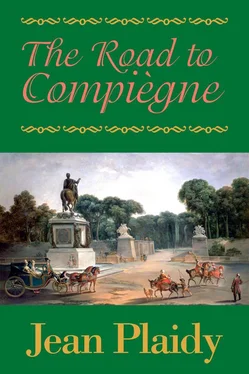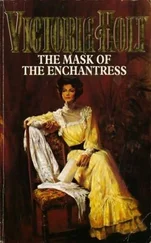‘Sire, this is a grievous thing which has befallen us, and Your Majesty in particular, but you will catch a fever if you stand here thus, hatless in the rain.’
The King looked up at the sullen skies, and the raindrops and the tears mingled on his cheeks.
‘It is the only mark of respect I can show her now,’ he said.
The cortège was passing along the Avenue de Paris, and the King felt he could no longer bear to watch it.
He turned from the balcony and stepped into his private sitting-room. Champlost followed him respectfully.
The dignity of Versailles closed in on the King. Life must go on, even though the Marquise had departed.
Louis suddenly seemed to remember what etiquette demanded of him. He said almost lightly: ‘The poor Marquise is having bad weather for her journey to Paris.’
The death of Madame de Pompadour left the King desolate. He could find little comfort, and the intimate suppers which had once been so much a feature of life at Versailles became gloomy affairs, continued from habit rather than because they gave any particular pleasure. It was the Marquise who had arranged the entertainments, who had chosen the guests, who had given all her time to making sure that the King was continually entertained. And how could any of those uneducated little girls at the Parc aux Cerfs, however passionate, however voluptuous, make him forget for more than an hour or two all that he had lost with the passing of the Marquise.
Sometimes he would say: ‘That will amuse the Marquise. I must tell her . . .’
Then he would stop abruptly and turn away.
The Duchesse de Gramont was eagerly waiting to offer him comfort, but Louis turned from her in disgust, and Choiseul, fearing his sister’s impatient exuberance, was forced to warn her to be very careful.
‘Time,’ murmured the Duc, ‘it is time he needs. Give him a month or two to mourn her and he will be tired of mourning.’
Meanwhile the King found a certain solace in the study of foreign affairs. He had little trust in any of his ministers; even Choiseul, he realised, was chiefly concerned with the well-being of Choiseul rather than that of France.
Perhaps one day, thought the King, it may be possible to retrieve our lost fortunes. If he could do that it might be that he would regain the affection of his people. He considered now what a victorious end to the Seven Years War might have meant. If France had emerged triumphant over her enemies, would the people perhaps have spoken his name with the respect they always showed to that other Bourbon, his ancestor, Henri Quatre?
He felt an enthusiasm which he had not known for years and which dulled the pain he experienced in the loss of the Marquise. He chose his secret agents – his, entirely his, unknown to anyone, even Choiseul – and dispatched them to the various Continental capitals. Their letters were seen by no one but himself.
He had come to a decision; his object should be the election to the Polish throne of a French Prince.
His grand-daughter Isabelle was betrothed to Joseph, heir to the Imperial throne. Madame Première, his daughter Louise-Elisabeth, had been right to insist on that betrothal. Poor Madame Première had died a few years before of the small-pox. The King did not wish to think of her. Death always depressed him deeply and his main desire was to escape from the memory of that more important death.
Thus Louis shut himself away in his petits appartements and mourned the Marquise.
* * *
The case against the Jesuits was meanwhile growing to a climax. Not only in France were factions rising against them; they were considered to be a menace all over the world. It was said that they governed all Catholic countries, not openly but in secret; they had set up their colleges everywhere and sought to educate the young to their way of thinking, and thus strengthen their brotherhood. They had insinuated themselves into many of the Courts of Europe, chiefly as confessors to Kings and Queens, thus acquiring great ascendancy over those who governed.
Some years before, a rich Jesuit, Père La Vallette, who was the Superior of the Jesuits of Martinique, had lost many of his ships to English pirates. Being unable to maintain his industrial settlement, he became bankrupt to the tune of three million francs. His creditors were in a state of panic, and a number of them in Marseilles demanded that the Society should pay them the million francs owed by La Vallette.
The Society declared that it was not responsible for the debts of one of its members, whereupon the Marseilles merchants appealed to the Parlement of Paris, which ordered Père de Sacy, the General of the Jesuits, to settle La Vallette’s debts.
The magistrates, who had sided with the Jansenites against the Jesuits in the many conflicts between the two, declared that this was more than a case of bankruptcy, and the affairs of the Society should be thoroughly investigated.
They declared that they had discovered the rules of the Society to be inconsistent with those of the Kingdom of France, and to be both disloyal and immoral. They ordered the colleges to be closed.
Those who supported the Jesuits, headed by the Dauphin and the Queen, made an immediate protest.
Choiseul and the Marquise had stood firmly on the side of the Parlement .
Madame de Pompadour had always considered the Jesuits a menace, but she had hated them more vehemently since their General, Père de Sacy, had refused to grant her absolution unless she left the Court. In the midst of this struggle she had died. Choiseul had determined on the expulsion of the Jesuits, but now that Madame de Pompadour was dead he had lost an ardent champion.
Louis was in no hurry to come to a decision. At the time of the investigation he sought to protect the Jesuits because he felt, as he had previously, that the Parlement was endeavouring to take his power from his hands. Eager as he was that France should not be in the power of the Pope – as the Jesuits wished her to be – he was equally determined that it was the King, not the Parlement , who should have the final say in the affairs of the country.
The Parlement had shown itself belligerent and, when he had attempted to oppose them over this matter of the Jesuits, had hinted that there should be an inquiry into the acquits au comptant . Louis knew that he could not face an inquiry into his private expenditure. The upkeep of the Parc aux Cerfs alone was excessive. There were young women who had been granted pensions and gifts; he had many children to maintain. Pretty little Mademoiselle Hainault had given him two delightful daughters, and it had cost a considerable amount to provide her with a pension and a husband in the Marquis de Montmelas. Adorable Lucie-Magdaleine d’Estaing, who was the natural daughter of the Vicomte de Ravel, had presented him with two charming daughters, Agnes-Lucie and Aphrodite-Lucie. He doted on his quartette of daughters, but they must be maintained in adequate comfort, and that cost money. There was the naughty little Mademoiselle de Tiercelin who was constantly demanding that her debts be paid. A life such as he led, although it presented him with variety and entertainment, also presented him with enormous bills. And he had no wish that the people should know the extent of his gallantries.
Already they talked of him as the Old Sultan, and exaggerated concerning the Parc aux Cerfs, which they called his harem; but until they had seen in black and white the cost of his pleasure, they must always doubt the authenticity of the stories they heard.
No, Louis could not allow his acquits au comptant to be made public and must submit to the blackmail of the Parlement .
Читать дальше








